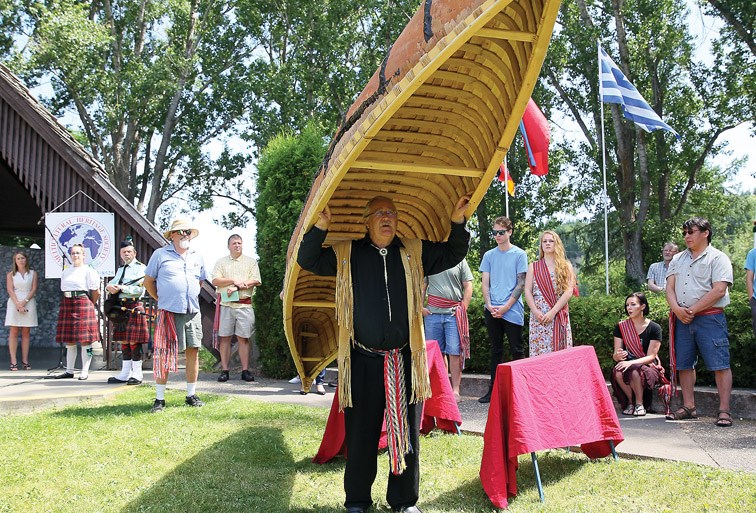Dressed in a black shirt and black pants with a beige leather fringed vest, it wasn't obvious but Marcel Labelle was sporting the colours of his country as he addressed the Canada Day crowd at Lheidli T'enneh Memorial Park.
"People asked me if I was going to wear white and red on Canada Day and my response was 'I am Algonquin French Canadian Métis, I am red and white,'" said Labelle. "I wear it every day."
Commissioned by the Department of Canadian Heritage through Le Cercle des Canadiens Français de Prince George to build a birch bark messenger canoe to celebrate Canada's 150th birthday, Labelle spent two months working with UNBC students at Two Rivers Art Gallery to complete the project.
From Matttawa, Ont., Labelle is a descendant of the Anishnaabe people, and his family roots in Canada date back to the 1600s and the fur trade which sent explorers west. He named his canoe The Indian Act 2017, which he hopes will spur meaningful discussions in the country on reconciliation with our First Nations people for mistakes made in our colonial past.
"My Anishnaabe ancestors shared this vessel with my French ancestors and Canada wouldn't be what it is today without this vessel," said Labelle. "Things went well for a long time, but around Confederation time things went awry and it's appropriate that the name of this canoe comes directly from the Constitution of Canada. We are celebrating Canada today, which is a beautiful country, and we have a lot to be proud of. But we can improve it and I have faith that we will make this country better than it is today.
"The message the canoe is bringing is we need to sit down and talk. We're offering Canada another chance to get it right. The Indian Act is still in our Constitution and it separates the people. We are treated differently. That needs to change."
Labelle has been traveling the country for 13 years speaking in schools about Canada's history of oppressing and discriminating against its native people. He's encouraged by what he calls a new way of thinking in the country which was echoed by Prime Minister Justin Trudeau in his speech Saturday at Parliament Hill in Ottawa.
"Many people are new immigrants here and they're learning what's happened here since contact and there's an openness," Labelle said. "When I listened to our prime minister speak this morning, he spoke to what this canoe is going to speak about, that we need to sit down and discuss this and be levelheaded.
"This is a good day because all across the country we have indigenous people - some of them not celebrating and that's fine and I'm not going to judge them - but many of them are participating. In that teepee at Parliament, things are going well. We need to sit down and chat."
The canoe will be launched into the Nechako River for its test on water on Wednesday at 11:30 a.m. at Cottonwood Island Park boat launch. Le Cercle des Canadiens Français de Prince George president Michel Bouchard said it has yet to be decided where the canoe will find its permanent home.

.png;w=120;h=80;mode=crop)

